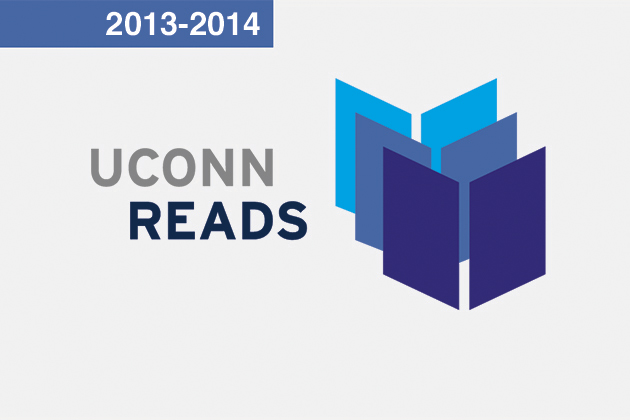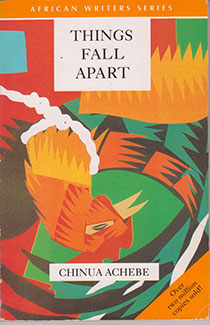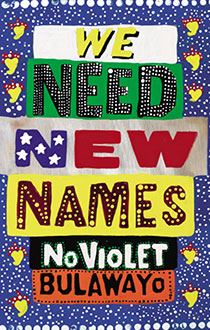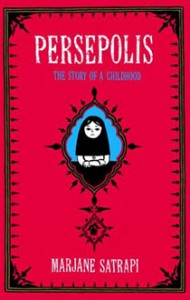In a letter to a friend, the naturalist Henry David Thoreau once wrote that “A man’s interest in a single bluebird is worth more than a complete but dry list of the fauna and flora of a town.” (Henry David Thoreau, “Letter to Daniel Ricketson, November 1858,” Familiar Letters of Henry David Thoreau, Houghton Mifflin, 1906.) As I share the UConn Reads Short List, I’ll try to give some careful, Thoreau-like consideration to each of the books.
But first the list, which is complete in itself but certainly not, to my way of thinking, dry! The Steering Committee selected these books from the Long List as the ones that address important issues and have the most potential to generate exciting programming and engage the UConn community:
- Chinua Achebe, Things Fall Apart (1959)
- NoViolet Bulawayo, We Need New Names (2013)
- Joseph Conrad, Heart of Darkness (1902)
- Arundhati Roy, The God of Small Things (2008)
- Marjane Satrapi, Persepolis (2004)
Although I’m presenting these in alphabetical order, it feels appropriate that the list starts with Achebe’s Things Fall Apart, a classic of modern fiction. With Achebe’s death earlier this year, as I’ve noted before, it seems a good moment to honor his book and its legacy. I was pleased to learn recently that Achebe had a connection to UConn – he taught here in 1975-76, and was a visiting speaker at least one other time.
In our discussion, several committee members noted that there’s an interesting arc in the three novels of Africa that appear on the Short List, from Conrad to Achebe to Bulawayo. Achebe wrote Things Fall Apart specifically in response to Conrad’s Heart of Darkness, to counter the picture of Africa presented there as savage and primitive, and to create richly drawn African characters. His famous essay “An Image of Africa: Racism in Conrad’s Heart of Darkness” (in Chinua Achebe, Hopes and Impediments: Selected Essays, 1965-1987, Heinemann, 1988) is a key text in postcolonial literary criticism.
Conrad’s novel is itself fascinating, difficult, and complex. Even as it presents Africa and Africans in ways that are highly problematic today, it also presents a powerful image of the corrupting influence of unchecked capitalism and colonialism. Conrad had served as a steamboat captain on the Congo River in 1890, and he asserted in his 1917 introduction to the book that “Heart of Darkness is experience, too; but it is experience pushed a little (and only a little) beyond the actual facts of the case for the perfectly legitimate, I believe, purpose of bringing it home to the minds and bosoms of the readers.”
While Achebe wrote to counter Conrad’s work, Zimbabwean writer NoViolet Bulawayo acknowledges the influence of Achebe in a more positive way. In fact, her blog includes this famous Achebe quote: “Let no one be fooled by the fact that we may write in English, for we intend to do unheard-of things with it.” A literary festival in Johannesburg, South Africa this coming weekend titled “Achebe’s Children: Africa’s Suspended Revolutions” will feature Bulawayo, among other African writers.
Arundhati Roy’s novel The God of Small Things shifts our attention to India. In a previous post, I noted that the novel tells the story of fraternal twins Rah and Estha growing up in their family home in the state of Kerala. It is a richly challenging exploration of the caste system, politics, and capitalism – made all the more interesting by Kerala’s long history as a center of the spice trade, and by its more recent tradition of democratically elected Communist governments.
Part of the attraction of this book is Arundhati Roy herself, a compelling figure who is a successful screenwriter, actress, and essayist, as well as a prominent activist. She has spoken out about environmental issues, women’s issues, globalization, American foreign policy, and nuclear arms. Some of her opponents have criticized her passionate style of writing and speaking on these issues, but she makes no apologies: “I am hysterical. I’m screaming from the bloody rooftops. And [my critics] are going ‘Shhhh … you’ll wake the neighbours!’ I want to wake the neighbours, that’s my whole point. I want everybody to open their eyes.” (N. Ram, “Scimitars in the Sun: N. Ram interviews Arundhati Roy on a writer’s place in politics”, Frontline Magazine, January 2001.)
Another Indian novelist who received numerous nominations, Jhumpa Lahiri, did not make the Short List, and I want to take a moment to explain why. Lahiri is a wonderful, exciting writer, and I am personally an enormous fan. However, other factors came into play in creating the Short List. The Benton will present a major exhibition of contemporary Indian art this fall and is planning to unite with A Novel Group of Huskies, the online alumni book club, to offer a Benton Reads program. Their selection is Lahiri’s The Namesake, and so the Steering Committee felt that that we should take the opportunity to focus on a different author for UConn Reads.
I’ll report more on the Benton Reads project later in the semester, but let me say now that the Steering Committee is very excited to support this Benton Reads initiative. Wouldn’t it be wonderful if complementary projects like Benton Reads sprang up across our campuses to occupy the fall semester of each year, even as we all plan to unite for UConn Reads in the spring?
And, finally, there is Persepolis, an autobiographical graphic novel by Iranian artist Marjane Satrapi, a coming-of-age story set during the Islamic Revolution and Iran-Iraq War. It was wonderful to see a graphic novel like Persepolis receive several nominations for UConn Reads – I was glad because I had been meaning to read it for some time and this gave me a good reason to. As one nominator wrote, “It’s a work of tremendous insight and power, told with intelligence, expressiveness, and humor.” The animated film version is just as wonderful as the book and powerful in its own way – in fact, in 2008 Satrapi was the first woman ever nominated for Best Animated Feature at the Academy Awards.
I’ve found myself going back to both the book and the film many times over the past few weeks, thinking about them and engaging once again with passages or images that are compelling, troubling, or moving. Satrapi has a poetic way with words and images, and her ability to render the emotional texture of her experiences during the Islamic Revolution, the Iran-Iraq War, and as an expatriate is compelling. Satrapi currently lives in France and rarely visits Iran because of the risk that she might not be able to leave again – but she yearns for the Iran of her youth, for, as she said in a recent interview, “It’s like taking a plant out of the earth and putting it in a vase. No matter how well you tend the flower, it is accustomed to the earth of its homeland.” (Kathrin Erdman, “The Comic World of Marjane Satrapi: Yearnings for a Lost Homeland,” 2011.)
Each of these books would make an exciting focus for UConn Reads. Which one will the committee choose? All I can say at this point is “wait and see.” We plan to announce the book Sept. 9.








